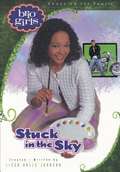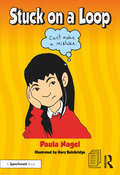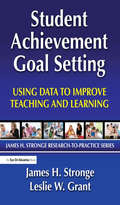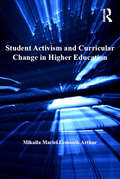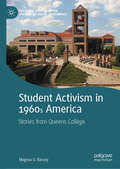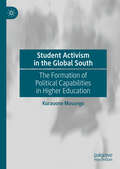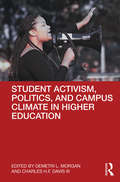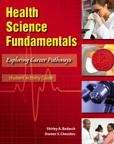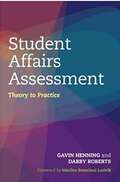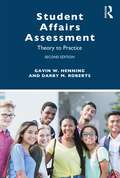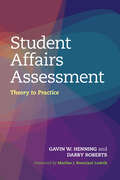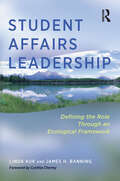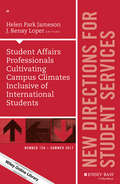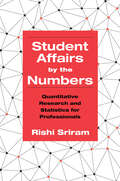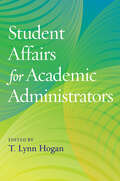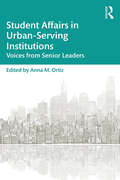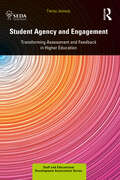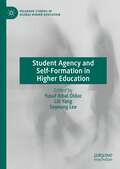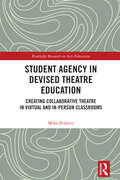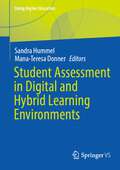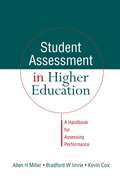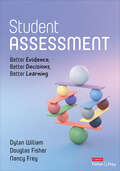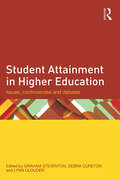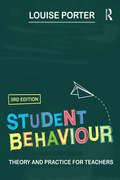- Table View
- List View
Stuck in the Sky
by Lissa Halls JohnsonJacie deals with conflicting feelings about her interest in art her faith and the new boy at school.
Stuck on a Loop: But What If...; Mind Reading; Stuck On A Loop; Waht Is It? (Rollercoaster Series)
by Paula NagelThis is a focus on intrusive thoughts and repetitive behaviour, linked to exam anxiety. Everyone knows Gemma always gets thing 'right' and is top of the class. However she feels under pressure to do well in the Year 5 tests and is becoming increasingly worried. She thinks she has to do certain things to continue to do well and get 'top marks', such as avoiding the cracks in the pavement. This habit starts to take over and Gemma wonders why she is doing this. As the story progresses, Gemma is helped to understand how it can be normal for anxiety and stress to affect thoughts. The metaphor of having a bully in her mind, making her do things she doesn't really want to do, is introduced. She decides to stand up to her inner bully before it takes over. The accompanying, 'Let's talk about. when thoughts get stuck,' highlights how stress and pressure can affect us, including some of the 'catastrophising' and 'black and white' thinking errors that can be linked with exam stress and pressure. Paul Nagel has worked as an educational psychologist for 17 years. This has included working as a Lead Professional Educational Psychologist managing a traded service, as well as holding Senior Specialist posts for early years and disability. Over the years Paula has worked in multi agency teams within paediatric services, youth offending teams, Sure Start and an anti bullying service. She is currently Principal Educational Psychologist (North) for the national children's mental health charity, Place2Be. Before qualifying as an Educational Psychologist Paula was a primary school teacher. Gary Bainbridge is an artist, comics creator and secondary school Art, Photography and Media Studies teacher from Durham. He's best known for the North East based kitchen sink superhero comic Sugar Glider and the Newcastle-set crime fiction comic, Nightbus. Gary teaches at an academy in Northumberland.
Student Achievement Goal Setting: Using Data to Improve Teaching and Learning
by Leslie Grant James StrongeThe first book in the James H. Stronge Research-to-Practice series focuses on improving student achievement through academic goal setting. It offers the tools and plan of action to use performance data to improve instructional practice and increase student achievement.
Student Activism and Curricular Change in Higher Education (The\mobilization Ser. On Social Movements, Protest, And Culture Ser.)
by Mikaila Mariel ArthurWhile higher education is still far from universal in the United States, it plays an increasingly large role in shaping our collective understanding of what knowledge counts as legitimate and important. Therefore, understanding the college curriculum and how it is changed and shaped helps us to understand the overall dynamics of knowledge in contemporary society. This book considers the emergence of three curricular fields that have developed and spread over the past half century in American higher education - Women's studies, Asian American studies and Queer/LGBT studies. It details the broader history of their development as knowledge fields and then explains how, when, and why individual colleges and universities may choose to adopt such innovations. Based on in-depth case studies of curricular change processes at six colleges and universities across the United States, the book demonstrates that social movements targeting colleges and universities play a major role in curricular change and sets forward a new model for understanding what it takes for social movements targeting organizations to make an impact.
Student Activism in 1960s America: Stories from Queens College (Palgrave Studies in the History of Social Movements)
by Magnus O. BasseyThis book sheds light on the untold stories of individual student activists at Queens College, New York City, during the 1960s. Against the backdrop of the ongoing Vietnam War and the assassination of President John F. Kennedy, some Americans began to lose faith in their government. Based on injustices that students saw in their campuses, in the country, and in the world at large, they began to question their political leaders. Students organized their discontents over three major issues: civil rights, free speech, and anti-war sentiments. Their protests involved direct actions such as sit-ins, marches, picketing, and boycotts. At Queens College (QC), as the students moved away from the repressive McCarthy era of the 1950s, they began to confront and challenge those in power at the college in the 1960s. The defining characteristic of this break from the past was a student strike in 1961 in objection to the ban of controversial speakers who had been invited to campus by student clubs. The student strike of 1961 gave the activists among them a direct and immediate way to fight power on campus and to fight racism and discrimination. The author argues that student movements cannot be attributed to a single explanation, and therefore, he focuses on individual historical contexts, presenting first-person narratives from the actual participants, and tells their stories in their own voices, from their own records, and from the documents they left behind. The book identifies the QC student activists of the 1960s, exploring how and why they became activists; their activities; their achievement as activists; and what motivated them to think that they could make history themselves by confronting racism. It provides an intimate look at the students’ lives and their social justice journey, beginning at Queens College and as they moved into their careers.
Student Activism in the Global South: The Formation of Political Capabilities in Higher Education
by Kurauone MasungoThis book makes an original conceptual and empirical contribution to debates on the role of student activism in enhancing social justice within education in the Global South, using South Africa as a case study. The book explores the development of higher education students’ political capabilities through student activism – that is, the freedom to express political ideas and engage in protests, including the following key capabilities: participation, dialogue, practical reasoning, voice, emotional expression, contextual knowledge and physical wellbeing. The author considers the possibility of enhancing justice and democracy in higher education through the formation of such student freedoms. The book will be of interest to academics and researchers in student activism, higher education and social justice, as well as institutional staff members with knowledge of student governance, members of student representative councils and higher education administrators.
Student Activism, Politics, and Campus Climate in Higher Education
by Demetri L. Morgan Charles H. F. Davis IIIStudent Activism, Politics, and Campus Climate in Higher Education presents a comprehensive, contemporary portrait of political engagement and student activism at postsecondary institutions in the United States. This resource explores how colleges and universities are experiencing unrest and in what ways broader sociopolitical conflicts are evident on-campus, ultimately unpacking the political dimensions of student engagement within campus climates. Chapter authors in this book critically synthesize relevant research, illuminate interdisciplinary perspectives, and interrogate how current issues of power and oppression shape participatory democracy and higher education at large. A go-to resource for researchers, faculty, administrators, and student affairs professionals, this text addresses the most intractable challenges facing society and its institutions of higher education.
Student Activity Guide for Health Science Fundamentals
by Shirley A. Badasch Doreen S. ChesebroProvides students with a variety of practice activities that include worksheets, scenarios, activities, and selected check-off sheets designed for both practice and competency assessment. These check-off sheets provided step-by-step instructions to help students perform Procedures correctly and competently. All of these activities will help students successfully learn the skills required for their respective career choices.
Student Affairs Assessment: Theory To Practice
by Gavin W. Henning Darby Roberts Marilee Bresciani LudvikWith the recognition of the integral role of student affairs in student education, and with stakeholders requiring increasing accountability at a time of tight resources, it has become imperative that staff be familiar with and competent in undertaking assessment. This book provides student affairs staff with the grounding they need to integrate assessment into how they design and monitor the programs, services, and activities they create to contribute to students’ development. This book is intended both as a text for student affairs and higher education master’s programs, and as a practical guide for early career staff who have had little formal preparation in assessment. It can be used for self-study or in professional development workshops. For divisions, departments, or units getting started with assessment, the discussion questions at the end of the chapters can engage staff in the process of developing an effective assessment culture. This book provides a thorough introduction to all aspects of assessment, assuming no prior knowledge, and illustrated throughout with examples of application in student affairs settings. Key elements include: •Takes into account the latest standards and competencies defined by AAC&U, ACPA, AER, CAS, NASPA, and others •Introductory and comprehensive •Provides essential background and theory •Covers preparation, planning and design •Describes the full range of assessment methods •Introduces principles and methods of qualitative and quantitative analysis •Guidance on using and sharing results •Addresses cultivating and sustaining a culture of assessment •Considers ethical and political concerns •Covers use of technology •Illustrated throughout by examples of practice in student affairs.
Student Affairs Assessment: Theory to Practice
by Gavin W. Henning Darby M. RobertsThis second edition of Student Affairs Assessment: Theory to Practice provides updated content that reflects current student affairs assessment practice and signals the direction in which the field is headed. Chapters feature foundational concepts of assessment design, outcomes, and data collection methods while also addressing current topics in student affairs assessment such as the prevalence of data analytics through higher education and equity-centered assessment. In addition, this volume further broadens the scope of the assessment process by highlighting the impact of culturally responsive ethics and Indigenous paradigms. Ultimately, this book provides student affairs staff with the grounding they need to integrate assessment into how they design and monitor the programs, services, and activities they create to contribute to students’ development. A useful reference for implementing assessment of co-curricular programs and services, this book is an excellent guide for student affairs practitioners and experienced assessment professionals to develop their assessment skills and knowledge.
Student Affairs Assessment: Theory to Practice
by Gavin W. Henning Darby RobertsWith the recognition of the integral role of student affairs in student education, and with stakeholders requiring increasing accountability at a time of tight resources, it has become imperative that staff be familiar with and competent in undertaking assessment. This book provides student affairs staff with the grounding they need to integrate assessment into how they design and monitor the programs, services, and activities they create to contribute to students’ development.This book is intended both as a text for student affairs and higher education master’s programs, and as a practical guide for early career staff who have had little formal preparation in assessment. It can be used for self-study or in professional development workshops. For divisions, departments, or units getting started with assessment, the discussion questions at the end of the chapters can engage staff in the process of developing an effective assessment culture. This book provides a thorough introduction to all aspects of assessment, assuming no prior knowledge, and illustrated throughout with examples of application in student affairs settings. Key elements include:• Takes into account the latest standards and competencies defined by AAC&U, ACPA, AER, CAS, NASPA, and others• Introductory and comprehensive• Provides essential background and theory• Covers preparation, planning and design• Describes the full range of assessment methods• Introduces principles and methods of qualitative and quantitative analysis• Guidance on using and sharing results• Addresses cultivating and sustaining a culture of assessment• Considers ethical and political concerns• Covers use of technology• Illustrated throughout by examples of practice in student affairs.
Student Affairs Leadership: Defining the Role Through an Ecological Framework
by James H. Banning Linda KukKuk and Banning offer readers a new lens for viewing leadership, one that goes beyond a focus on the behavior and values of leaders as individuals to examine how positional leaders interact with their environments to engage in leadership “in context”. This book is addressed to aspiring and senior student affairs officers and offers a new “ecological” framework that recognizes that today’s leaders are affected by factors they may not control, and work within an environment they cannot expect to mold solely through their execution of skills and strategies.Based on research supported through a grant from the National Association of Student Personnel Administrators (NASPA) Foundation, this book explores leadership as an interactive process within varied environmental contexts, and through an analysis of the transactional process between the leader, the organizational members and the various components of the organizations environment.It describes how leaders deploy differing competencies, skills and strategies in varied contexts, and how they choose to use past experiences, their training and personal characteristics to set priorities and navigate the cultural, social, physical, legal and political, resource, and ethical environments of their organizations.Several chapters conclude with an account of how the experiences of the SSAO participants in the research informed their practice of leadership and understanding of how leadership actually works.
Student Affairs Professionals Cultivating Campus Climates Inclusive of International Students: New Directions for Student Services, Number 158 (J-B SS Single Issue Student Services)
by Helen Park Jameson J. Renay LoperWith the increase in the international student population, student affairs professionals need a deeper understanding of the challenges and benefits of globalizing a campus. This volume: Examines how student affairs professionals and their campus partners might welcome diverse populations of international students. Provides strategies for enhancing interactions between international and domestic students, as well as the greater campus community. Offers innovative, culturally competent approaches to working with international students. Shares ways to inclusively and effectively educate and support international students to succeed on campuses in the USA. Shares examples of innovative programs designed to increase cultural competence and be more inclusive of international students both inside and outside the classroom. This sourcebook explores the various ways international students in the United States strengthen our country and campus communities, further citizen diplomacy, increase intercultural competency skills, and develop more global mindsets.This is the 158th volume of this Jossey-Bass higher education quarterly series. An indispensable resource for vice presidents of student affairs, deans of students, student counselors, and other student services professionals, New Directions for Student Services offers guidelines and programs for aiding students in their total development: emotional, social, physical, and intellectual.
Student Affairs by the Numbers: Quantitative Research and Statistics for Professionals
by Rishi SriramStudent Affairs by the Numbers aims to be the go-to book for student affairs professionals who want to know the basics of quantitative research and statistics for their work. Books on assessment in student affairs tend to discuss processes more than research design and statistics. Most books on statistics share too much information for practitioners, overwhelming them and making it difficult to discern what they need to know. Since these books do not use examples from student affairs, it is even more difficult for practitioners to connect with new concepts.Student Affairs professionals need to know how to design a study, collect data, analyze data, interpret results, and present the results in an understandable manner. This book will begin by establishing the need for these skills in student affairs and then quickly move to how to develop a research culture, how to conduct research, how to understand statistics, and concluding with how to change our research/assessment behaviors in order to make higher education better for students.
Student Affairs for Academic Administrators (An ACPA Co-Publication)
by T. Lynn HoganCo-published with In these days when every college or university needs to make the best use of resources, Student Affairs for Academic Administrators is intended to help academic administrators make the best use of one vital campus resource: student affairs. By providing this concise introduction to student affairs as a discipline and a profession, the authors of this volume provide a foundation for working together to improve the student experience and enhance learning. Since academic administrators typically come up through the faculty ranks, they are unlikely to have a good grasp of what their student affairs colleagues bring to the common work of education. To provide a better understanding, the chapters in this volume cover topics such as: • The history of student affairs, and functions typically associated with student affairs divisions; • Current thinking and research in student development theory; • Theoretical constructs underlying contemporary student affairs practice (and ways to employ these theories in academic administration); • Diversity issues and their impact on student outcomes in the collegiate environment.After a chapter on how to build successful collaborations between academic affairs and student affairs, two final chapters explore specific examples of how such collaborations work in practice: Academic honor codes, and undergraduate research. While written for academic administrators, the book also provides valuable insights for those in student affairs seeking to improve understanding and facilitate collaboration with colleagues in academic affairs.
Student Affairs in Urban-Serving Institutions: Voices from Senior Leaders
by Anna M. OrtizStudent Affairs in Urban-Serving Institutions: Voices from Senior Leaders addresses a critical gap in literature concerning the unique structure, students, and missions of urban-serving institutions (USIs). Examining the challenges and contributions of student affairs professionals in serving and meeting the needs of urban students, this volume discusses how services and interventions must reflect the reality of students, understand the sociopolitical forces that affect students’ lives, and bring together a network that includes family and community. Each chapter in this volume captures the voices of student affairs leaders who not only share a range of important professional experiences, insights, and lessons learned but also unpack research and literature on competencies, knowledge bases, and experiences needed to work in urban universities and community colleges. This important book will help graduate students as well as new and continuing professionals, faculty, and scholars impact practice and policy and become agents of change in their communities.
Student Agency and Engagement: Transforming Assessment and Feedback in Higher Education (SEDA Series)
by Tansy JessopThis book offers fresh perspectives on the challenges of assessment and feedback in higher education. A must-read for university leaders, academics, and educational developers, it asks ‘what if’ questions to unlock some of the systemic problems of assessment and feedback. It shifts the debate to focus on students’ experience at a programme level, introducing a different way of thinking about assessment and feedback, and advancing the value of theories of alienation and engagement. Based on the ‘Transforming the Experience of Students through Assessment’ (TESTA) project, the book discusses a method for understanding the impact of assessment and feedback on student learning. Drawing on evidence from TESTA, it provides practical insights about changing programme assessment patterns to foster student agency and engagement. The book gives impetus to changing the design assessment and feedback, inviting academics, educational leaders, and students into more transparent, open, and shared decision-making about assessment and feedback beyond the module level. This key title is designed to support academics and educational leaders to making sustainable and systemic improvements to the pedagogy of assessment. It expands on good principles, practices, and theories about how students learn from assessment and feedback by paying attention to a programme level perspective of the student experience.
Student Agency and Self-Formation in Higher Education (Palgrave Studies in Global Higher Education)
by Lili Yang Soyoung Lee Yusuf Ikbal OldacThis edited volume argues for positioning students at the centre of higher education, drawing from the concepts of student agency and self-formation. The volume highlights that higher education has broader and more important purposes than what a neoliberal human capital approach would suggest, and explores how students exercise their agency and realise self-formation as inherently connected concepts throughout university education. With disciplinary, cultural, and contextual diversity, this volume will provide international perspectives to readers interested in higher education theories, policies, and practices.
Student Agency in Devised Theatre Education: Creating Collaborative Theatre in Virtual and In-Person Classrooms (Routledge Research in Arts Education)
by Mike PobleteThis monograph argues that implementing devised theatre as a learning praxis has a unique potential to cultivate student agency in the twenty-first century classroom. It offers actionable guidance for drama instructors by providing a new arts education methodology that emphasizes the role of student-led dramaturgy. Based on quantitative and qualitative analyses of survey results, group interviews, and field observations from the facilitation of two original pieces of digital devised theatre created by Pacific Islander and Asian-American public high school students on Oʻahu, the author documents the crucial roles of constructive and resisting student agency in a devised theatre classroom. This book then departs from established research in suggesting that passivity serves a crucial role in allowing students to assert agency nonconfrontationally, which has considerable implications for peripatetic learners. It also investigates the role of student agency in online theatre education, which, along with expected challenges, was found to produce unique benefits, such as real-time documented performance feedback and accessible asynchronous teacher guidance. Further, a new form of student agency is identified, one exclusive to online learning environments, where students assert themselves by discussing technological challenges such as slow Wi-Fi, camera malfunctions, or other pragmatic concerns. Finally, this book makes a case that the success of these projects with Pacific Islander and Asian-American students suggests that although devising comes from a White Eurocentric tradition, it can provide an effective learning strategy for students from a wide variety of backgrounds.As global discourse continues to push toward reform that would allow populations around the world increased agency over their lives, this volume makes a unique contribution to the critical conversation around student agency in education today and will appeal to scholars and researchers across arts education, and theatre and performance studies.
Student Assessment in Digital and Hybrid Learning Environments (Doing Higher Education)
by Sandra Hummel Mana-Teresa DonnerAssessment is a fundamental factor in monitoring the learning process of students and therefore an essential component of effective teaching and learning in the online environment. In the course of the (corona-induced) wave of digitization, the new and different forms of assessment present us with new challenges. The book focuses on these new forms of digital assessments and highlights effective practices and opportunities associated with conducting assessments in digital and hybrid learning environments.
Student Assessment in Higher Education: A Handbook for Assessing Performance
by Kevin Cox Bradford W. Imrie Allen MillerThis text provides higher education teachers with an overview of the many approaches to setting, marking and reviewing coursework, assignments, tests and examinations used in programmes for certificates, diplomas, first degrees or higher degrees. It discusses the influence of each on students.
Student Assessment: Better Evidence, Better Decisions, Better Learning
by Douglas Fisher Nancy Frey Dylan WiliamFuel student-driven success and enhance learning with better assessment What if there was a better way to collect and interpret assessment data that could strengthen the link between teaching and learning? Student Assessment: Better Evidence, Better Decisions, Better Learning is the innovative guide to show you how it′s done and done right. This unique book offers a new assessment model focused on decision-driven data collection and provides an arsenal of tools for collecting better evidence to increase student learning. You will learn: the importance of assessment in the teaching and learning process what a decision-driven data collection assessment model looks like and how it differs from a more traditional data-driven decision-making model how to effectively establish learning intentions and success criteria within assessments to actively engage students in their own learning how to implement an array of assessment tools that yield better evidence and improve decision-making how to address the challenge of ensuring authenticity in students′ responses when AI-generated content is becoming more common With this guide in hand, you′ll be ready for a better approach to assessment—armed with practical tools and strategies to ensure students can analyze, synthesize, adapt, critique, and most importantly, take charge of their own learning.
Student Assessment: Better Evidence, Better Decisions, Better Learning
by Douglas Fisher Nancy Frey Dylan WiliamFuel student-driven success and enhance learning with better assessment What if there was a better way to collect and interpret assessment data that could strengthen the link between teaching and learning? Student Assessment: Better Evidence, Better Decisions, Better Learning is the innovative guide to show you how it′s done and done right. This unique book offers a new assessment model focused on decision-driven data collection and provides an arsenal of tools for collecting better evidence to increase student learning. You will learn: the importance of assessment in the teaching and learning process what a decision-driven data collection assessment model looks like and how it differs from a more traditional data-driven decision-making model how to effectively establish learning intentions and success criteria within assessments to actively engage students in their own learning how to implement an array of assessment tools that yield better evidence and improve decision-making how to address the challenge of ensuring authenticity in students′ responses when AI-generated content is becoming more common With this guide in hand, you′ll be ready for a better approach to assessment—armed with practical tools and strategies to ensure students can analyze, synthesize, adapt, critique, and most importantly, take charge of their own learning.
Student Attainment in Higher Education: Issues, controversies and debates
by Graham Steventon Debra Cureton Lynn ClouderStudent Attainment in Higher Education: Issues, controversies and debates is a timely exploration of student attainment in a rapidly changing higher education context and a rapidly changing world. The effects of neoliberalism and the commercialization of everyday life on education have been well documented, but with a focus on pedagogy, whilst student success is measured through grades, statistics and metrics. By exploring attainment in a broader context, this book provides a unique contribution to the critical literature on contemporary higher education. Within the themes of understanding attainment and challenging practice, the book sets out to explore student attainment as complex and multifaceted. It achieves this by looking at different conceptualizations of what attainment means and to whom; how attainment is shaped by different and often competing agendas and vested interests. The book highlights these wider issues, controversies and debates that underpin student attainment, whilst at the same time engaging with strategic and local interventions, which set out to improve aspects of the higher education system and increase individual and social agency within it. Sharing a range of pedagogical approaches and interventions, some of the key topics include: addressing attainment gaps engaging mature learners nurturing the intellectual identity the impact of activity choices. Creating a dialogue amongst different audiences about national and international controversies and debates around the topic of student attainment, this contribution will be beneficial to teaching professionals, policymakers and strategists. As an edited collection with contextualisation in the wider research arena, the book has both national and international applicability and transferability.
Student Behaviour: Theory and practice for teachers
by Louise PorterBehaviour management in the classroom and schoolyard is one of the most challenging aspects of teaching. Student Behaviour offers a comprehensive overview of the major theories of behaviour management in primary and secondary schools, illustrated with detailed case studies.Porter outlines how teachers can develop a personal approach to classroom management based on a sound understanding of theory. The emphasis is on proactive approaches to discipline to assist students in achieving educational and social goals. Porter also shows how to enhance students' motivation and help students become confident and independent learners. This third edition has been fully revised and updated to reflect the latest research, and includes new material on collaborating with parents, ethical issues, dealing with bullying and helping students to be autonomous in their learning and behaviour. Examples and references are drawn from current international research.Student Behaviour is an essential textbook for preservice teachers and a valuable reference for more experienced teachers who want to improve their ability to cope with disruptive behaviour. The style of writing is clear, accessible and authoritative an ideal text for all teachers in initial and post-experience training. It treats its audience as intelligent and discerning, provides a clear digest of a very wide range of published material, and allows its readers to reach their own decisions about suitable and sensitively executed approaches that are likely to be of lasting value.' - British Journal of Educational Psychology
